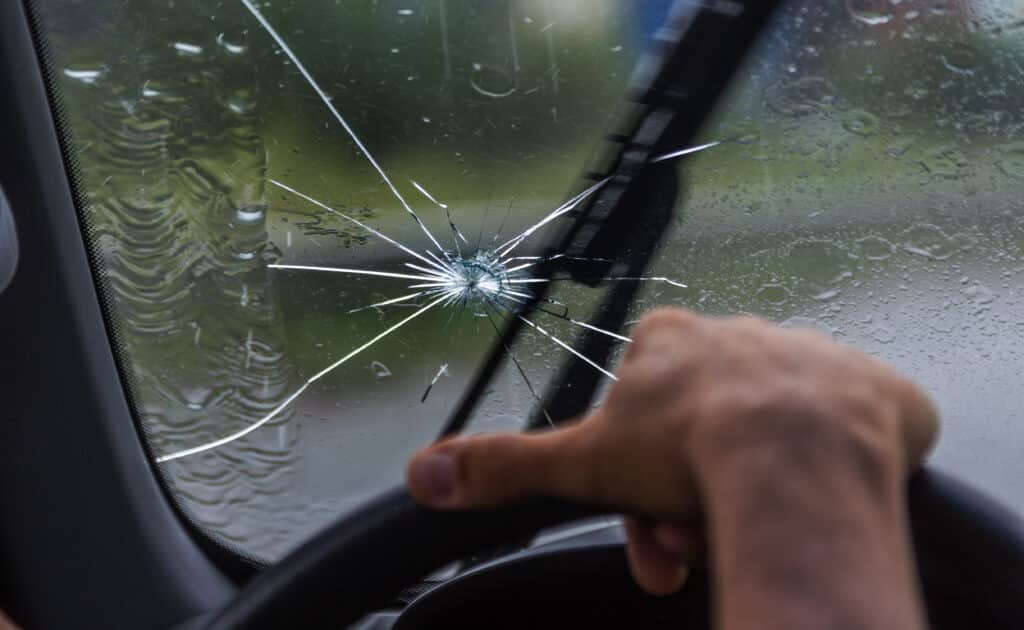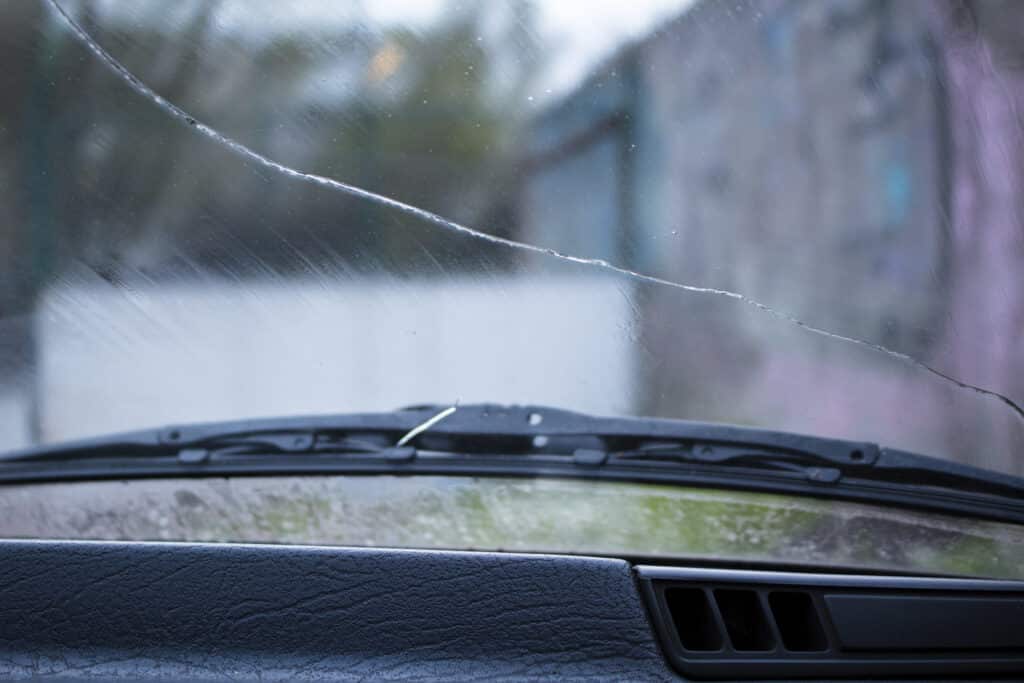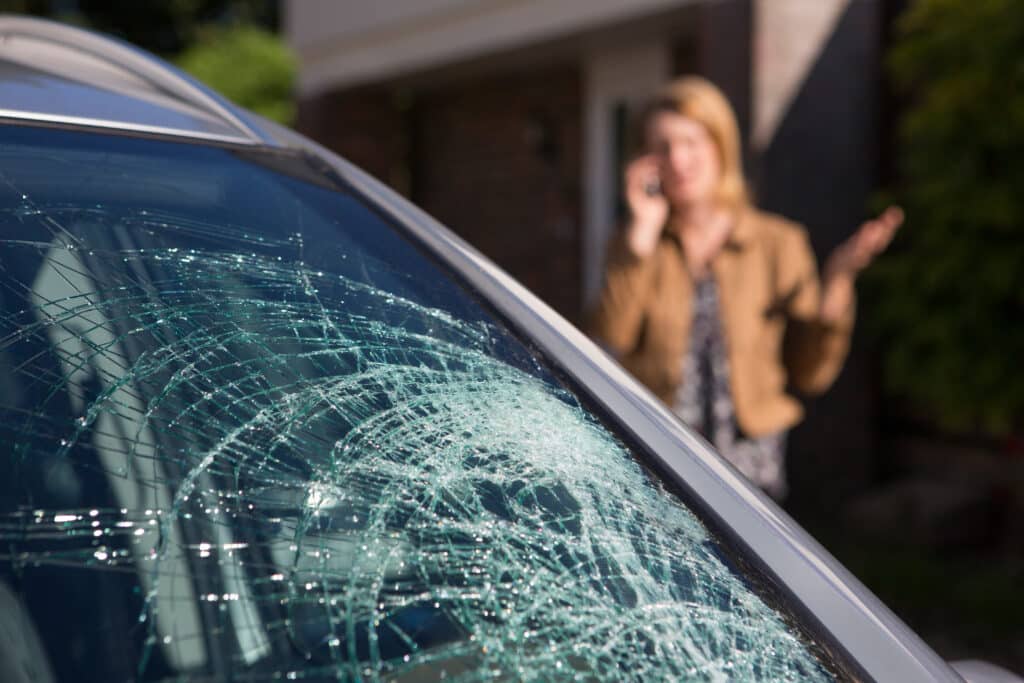Not all windshield cracks are created equal. Some are created upon impact, perhaps from a rock propelled into the air by another car on the road, while others result from fluctuations in temperature. While windshields are designed to be tough, the road is a dangerous place and there are many different elements that can crack a windshield. Knowing about them can help you protect your vehicle.

Common Types of Windshield Damage
When we say “crack a windshield,” what do we really mean? Not all damage to a windshield can be called cracks. The other main family of windshield damage is chips.
Chips can often be repaired. While there are many different kinds, affecting the layers of the windshield differently, chips refer to any small damage to a windshield. Cracks are larger, describing streaks of damage across the glass. It is less common for cracks to be repaired, but sometimes, if they are less than 14 inches long and not in the driver’s sightline, repair is possible. Otherwise, it’s better to replace the entire windshield.
Factors that can Crack a Windshield
There are many different events and conditions that can damage a windshield. For example, dirt and other debris, when it gets between the layers of glass and plastic of a windshield, and further pry the seal apart. Here are the most common causes of cracks and chips:
Pressure
The biggest offender when it comes to windshield damage is pressure. Most cracks and chips are created on impact from rocks or other road debris that is kicked up by the tires of other vehicles. When it comes down to it, it is astonishing that such little hazards can crack a windshield, considering that windshields are made of layers of plastic and laminated glass.

In order to crack a windshield, a projectile has to exert approximately 20,000 to 24,000 psi of pressure, roughly 60 pounds of force. In such cases, physics works against drivers because smaller objects can deliver less force and still achieve the same result.
More manual pressure can also cause damage to a windshield. Dry windshield wipers can scrape the glass, and the jolting movement of hitting bumps or dips in the road can put stress on a windshield and worsen any cracks. If your windshield is damaged, be mindful of the pressure you apply when you clean it.
Heat
It would be very impractical if windshields cracked every time it got a little too chilly outside. However, while windshields are designed to hold up in all kinds of weather, there are two things to look out for. The center of laminated glass can soften under intense heat. In such a state, breakage is more likely.
You are more likely to crack a windshield during rapid temperature changes, such as when you hit a winter windshield with water or turn the heat on in your car too rapidly. Always allow your windshield to adjust to new temperatures gradually.
Moisture
Moisture is more likely to affect windshields that already have damage. If water gets in between the layer of the windshield, it can weaken the seal, especially if temperatures dip below freezing. Be mindful of car washes, which can force detergents between the layers too.

Can a Cracked Windshield Shatter?
As mentioned above, windshields are made of laminated glass. This means that each windshield is a little like a sandwich, with two layers of glass encasing a thin layer of plastic film. When it comes to answering the question “can a cracked windshield shatter,” the bottom line is yes.
Windshield damage is cumulative. Any compromise to the windshield’s structural integrity weakens the entire surface, making it vulnerable to more damage. Windshield glass naturally expands and contracts at least slightly as temperatures rise and fall throughout the day. If the glass is damaged, such fluctuations can exacerbate the issue.
Any of the other factors on this list can further worsen windshield damage to the point of shattering. Fortunately, the likelihood of the windshield collapsing into the vehicle or out onto the hood is low. Windshields are held in place with strong urethane adhesives which are designed to minimize exterior noise, leaking, and windshield shifting.
Even if you are not concerned about your windshield shattering, if you have damage to your windshield, the smart thing to do is to get it checked out. Again, any aberrations make windshields more vulnerable to damage, and that puts your safety at risk. Repairing rock chips early on can also save you money if you don’t have to replace the entire windshield.
